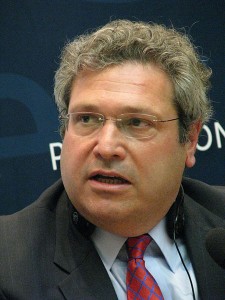Reprinted from Consortium News
Historically, one of the main threads of U.S. foreign policy was called "realism," that is the measured application of American power on behalf of definable national interests, with U.S. principles preached to others but not imposed.
This approach traced back to the early days of the Republic when the first presidents warned of foreign "entangling alliances" -- and President John Quincy Adams, who was with his father at the nation's dawning, explained in 1821 that while America speaks on behalf of liberty, "she has abstained from interference in the concerns of others, even when conflict has been for principles to which she clings, as to the last vital drop that visits the heart. "
"Wherever the standard of freedom and independence has been or shall be unfurled, there will her heart, her benedictions and her prayers be. But she goes not abroad, in search of monsters to destroy."
In the wake of such heartless actions -- like imposing pliable "pro-business" dictatorships on countries such as Iran, Guatemala, Congo, Indonesia, Chile and engaging in the bloodbath of Vietnam -- "realism" developed a deservedly negative reputation as other supposedly more idealistic foreign policy strategies gained preeminence.
Some of those approaches essentially turned John Quincy Adams's admonition on its head by asserting that it is America's duty to search out foreign monsters to destroy. Whether called "neoconservatism" or "liberal interventionism," this approach openly advocated U.S. interference in the affairs of other nations and took the sides of people who at least presented themselves as "pro-democracy."
In recent years, as the ranks of the "realists" -- the likes of George Kennan, Henry Kissinger and Brent Scowcroft -- have aged and thinned, the ranks of the neocons and their junior partners, the liberal interventionists, swelled. Indeed, these "anti-realists" have now grown dominant, touting themselves as morally superior because they don't just call for human rights, they take out governments that don't measure up.
The primary distinction between the neocons and the liberal interventionists has been the centrality of Israel in the neocons' thinking while their liberal sidekicks put "humanitarianism" at the core of their world view. But these differences are insignificant, in practice, since the liberal hawks are politically savvy enough not to hold Israel accountable for its human rights crimes and clever enough to join with the neocons in easy-to-sell "regime change" strategies toward targeted countries with weak lobbies in Washington.
In those "regime change" cases, there is also a consensus on how to handle the targeted countries: start with "soft power" -- from anti-regime propaganda to funding internal opposition groups to economic sanctions to political destabilization campaigns -- and, then if operationally necessary and politically feasible, move to overt military interventions, applying America's extraordinary military clout.
Moral Crusades
These interventions are always dressed up as moral crusades -- the need to free some population from the clutches of a U.S.-defined "monster." There usually is some "crisis" in which the "monster" is threatening "innocent life" and triggering a "responsibility to protect" with the catchy acronym, "R2P."
But the reality about these "anti-realists" is that their actions, in real life, almost always inflict severe harm on the country being "rescued." The crusade kills many people -- innocent and guilty -- and the resulting disorder can spread far and wide, like some contagion that cannot be contained. The neocons and the liberal interventionists have become, in effect, carriers of the deadly disease called chaos.
And, it has become a very lucrative chaos for the well-connected by advancing the "dark side" of U.S. foreign policy where lots of money can be made while government secrecy prevents public scrutiny.
As author James Risen describes in his new book, Pay Any Price, a new caste of "oligarchs" has emerged from the 9/11 "war on terror" -- and the various regional wars that it has unpacked -- to amass vast fortunes. He writes: "There is an entire class of wealthy company owners, corporate executives, and investors who have gotten rich by enabling the American government to turn to the dark side. ... The new quiet oligarchs just keep making money. They are the beneficiaries of one of the largest transfers of wealth from public to private hands in American history." [p. 56]
And the consolidation of this wealth has further cemented the political/media influence of the "anti-realists," as the new "oligarchs" kick back portions of their taxpayer largesse into think tanks, political campaigns and media outlets. The neocons and their liberal interventionist pals now fully dominate the U.S. opinion centers, from the right-wing media to the editorial pages (and the foreign desks) of many establishment publications, including the Washington Post and the New York Times.
By contrast, the voices of the remaining "realists" and their current unlikely allies, the anti-war activists, are rarely heard in the mainstream U.S. media anymore. To the extent that these dissidents do get to criticize U.S. meddling abroad, they are dismissed as "apologists" for whatever "monster" is currently in line for the slaughter. And, to the extent they criticize Israel, they are smeared as "anti-Semitic" and thus banished from respectable society.
(Note: You can view every article as one long page if you sign up as an Advocate Member, or higher).






